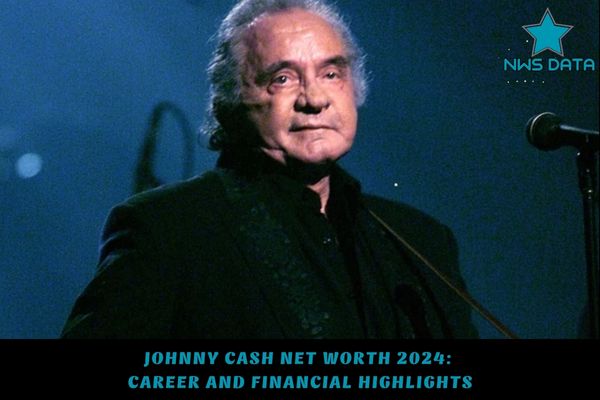Johnny Cash net worth 2024 is driven by his music career, business ventures, and lasting influence. His legacy spans generations, with his music continuing to influence the worlds of country music, rock music, and beyond.
In this article, we aim to delve into Johnny Cash net worth, sources of income, and personal life, giving you a clear understanding of how he amassed his fortune and how his legacy continues to generate wealth. From his music royalties to his business ventures, this article will explore the key aspects that contributed to his financial success.
Table of Contents
ToggleQuick Facts
| FACT | DETAIL |
|---|---|
| Real Name | J. R. Cash |
| Popular Name | Johnny Cash |
| Net Worth | 60 million (adjusted) |
| Salary | N/A |
| Birth Date | February 26, 1932 |
| Birthplace | Kingsland, Arkansas, USA |
| Gender | Male |
| Height | 1.88 m |
| Parents | Carrie Cloveree, Ray Cash |
| Siblings | Six |
| Marital Status | Divorced |
| Wife/Spouse | Vivian Liberto (1954–1966), June Carter Cash (1968–2003) |
| Dating | N/A |
| Children | John Carter, Rosanne, Kathy, Tara, Cindy |
| Education | High School |
| Profession | Singer-Songwriter |
| Nationality | American |
What Is Johnny Cash Net Worth in 2024?
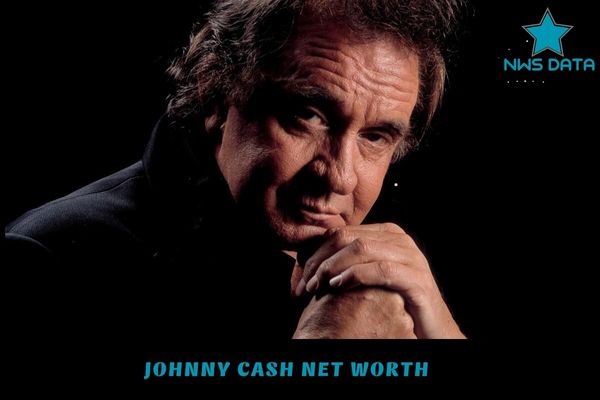
Johnny Cash net worth 2024 remains estimated at $60 million, after adjusting for inflation. His wealth primarily comes from a combination of album sales, royalties, real estate investments, and live performances. When compared to his peers, his financial success stands out:
- June Carter Cash: $10 million
- Waylon Jennings: $7 million
- Willie Nelson: $25 million
These numbers underscore his enduring cultural and financial legacy in the music industry.
To explore more about the finances and assets of famous singers, check out more information at Singer.
Johnny Cash Early Life
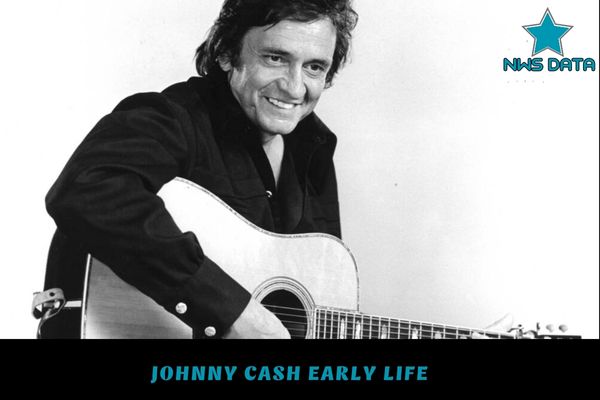
Johnny Cash, born on February 26, 1932, in Kingsland, Arkansas, was raised in a working-class family during the Great Depression. His family’s hard work in the cotton fields heavily influenced the themes of struggle and resilience found in his music.
Early exposure to gospel music played a key role in shaping his unique sound, and by high school, he was already performing on local radio stations.
After graduation, he joined the U.S. Air Force, serving as a Morse code operator in Germany. This experience helped instill a sense of discipline and further strengthened his bond with music.
Upon returning to the U.S., he moved to Memphis, where he signed with Sun Records, marking the beginning of his iconic career. These early years were crucial in establishing the foundation for his global success.
Johnny Cash Finance Overview
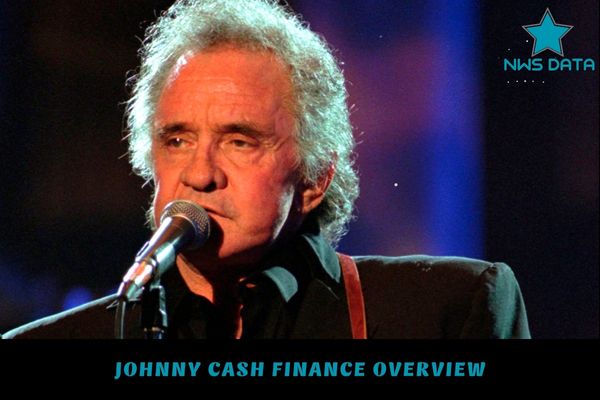
Key Milestones
Johnny Cash net worth success was driven by a series of pivotal career milestones:
- Sun Records Breakthrough: Hits like Cry, Cry, Cry and I Walk the Line highlighted his distinctive sound, building a growing fan base.
- Columbia Records Partnership: After leaving Sun Records, he joined Columbia, which offered him creative freedom and access to a broader audience.
- Concert Tours: Known for his electrifying performances, he toured extensively, cultivating a loyal fan base and generating significant ticket revenue.
- Man in Black Persona: His signature choice of all-black attire became a marketing symbol, boosting his public image and strengthening his branding.
Music Releases
His music catalog played a central role in his wealth:
- Album Sales: With over 90 million records sold globally, his music remains in high demand, with albums like Johnny Cash at Folsom Prison becoming massive commercial successes.
- Live Recordings: his prison albums (e.g., San Quentin) not only resonated deeply with fans but also generated consistent revenue.
- Cross-Genre Appeal: his ability to blend country, gospel, and rock attracted a diverse audience, boosting both album sales and royalties.
- Later Collaborations: His work with producer Rick Rubin introduced his music to younger generations, revitalizing his career with critically acclaimed albums like American IV: The Man Comes Around, which also boosted his revenues.
Royalties and Long-Term Revenue Streams
His legacy ensured long-lasting financial returns:
- Timeless Hits: Classic songs like Ring of Fire and Folsom Prison Blues continue to generate significant royalties through streaming services, radio airplay, and licensing for commercials, films, and TV shows.
- Streaming Success: Platforms like Spotify and Apple Music brought his catalog to a fresh audience, creating a new revenue stream.
- Publishing Rights: As a songwriter, he earned royalties each time his tracks were performed, recorded, or covered by other artists.
Media Appearances & Public Performances
His expanded his income through television and film appearances:
- The Johnny Cash Show: His variety show, which aired from 1969 to 1971, not only earned him substantial income but also significantly broadened his audience.
- Film Roles: Appearances in films like Five Minutes to Live added to his income while expanding his brand.
- Special Concerts: Iconic live performances at prisons like Folsom and San Quentin became important revenue generators and were turned into albums and televised specials.
Endorsements and Brand Collaborations
His iconic status led to lucrative partnerships:
- Man in Black Branding: His distinct style made him a compelling figure for endorsements, especially for products associated with his image.
- Memorabilia: Cash-related merchandise, from posters to clothing, contributed to his financial portfolio.
- Posthumous Licensing: His estate continues to benefit from licensing deals, ensuring his image and music stay commercially relevant.
Real Estate Investments
His financial portfolio included strategic real estate investments: His success enabled him to acquire properties, diversifying his income and strengthening his wealth.
Johnny Cash Personal Life
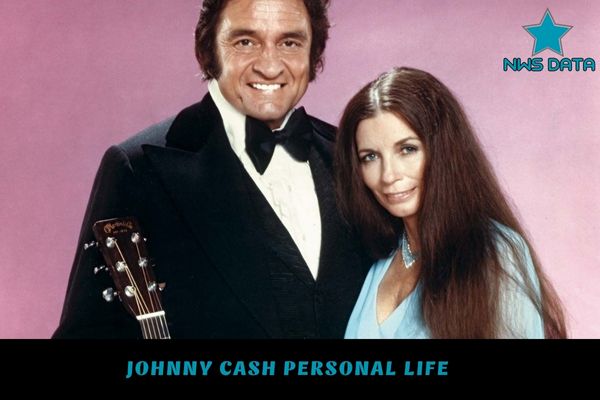
Johnny Cash’s personal life was as dynamic and complex as his career. His first marriage to Vivian Liberto ended in divorce, largely due to his battles with addiction. However, his second marriage to June Carter Cash became a symbol of redemption. Their bond was not only built on love but also on collaboration, producing iconic duets like Jackson.
Together, he and June raised five children, including Rosanne and John Carter Cash, both of whom were integral parts of his family life. Family played a key role in his later years, with his son becoming a source of inspiration for his sobriety.
Despite facing numerous challenges, including struggles with addiction and legal issues, his resilience and ability to overcome adversity left a profound and lasting impact, both personally and professionally.
Social Media
Instagram: https://www.instagram.com/johnnycash/
Facebook: https://www.facebook.com/johnnycash/
Tiktok:https://www.tiktok.com/@johnnycash
FAQs About Johnny Cash
What Inspired Johnny Cash’s Music?
Johnny Cash was deeply inspired by his childhood hardships, gospel music, and his life experiences. These influences shaped his songs, which resonated with listeners due to their authenticity and emotional depth.
How Did Johnny Cash Earn His Nickname?
He became known as the Man in Black because he chose to wear black attire as a symbol of solidarity with the oppressed. It also served as a practical choice for his extensive touring schedule.
What Were Johnny Cash’s Contributions to Activism?
He was a passionate advocate for prison reform and Native American rights. He used his fame and platform to bring attention to the struggles of marginalized communities, amplifying their voices through his music and public actions.
What Were Johnny Cash’s Career Challenges?
His journey was not without obstacles. He faced struggles with addiction and conflicts with record labels, but he managed to overcome these hurdles, producing timeless music that solidified his legendary status.
What Legacy Did Johnny Cash Leave Behind?
His music, activism, and personal redemption have left an indelible mark on the world. His contributions continue to inspire new generations, securing his place in history as a legendary artist.
Conclusion
Explore Johnny Cash net worth and his lasting impact on music and culture at Net Worth Stars Data. We’d love to hear your thoughts—feel free to share your comments and join the discussion!

